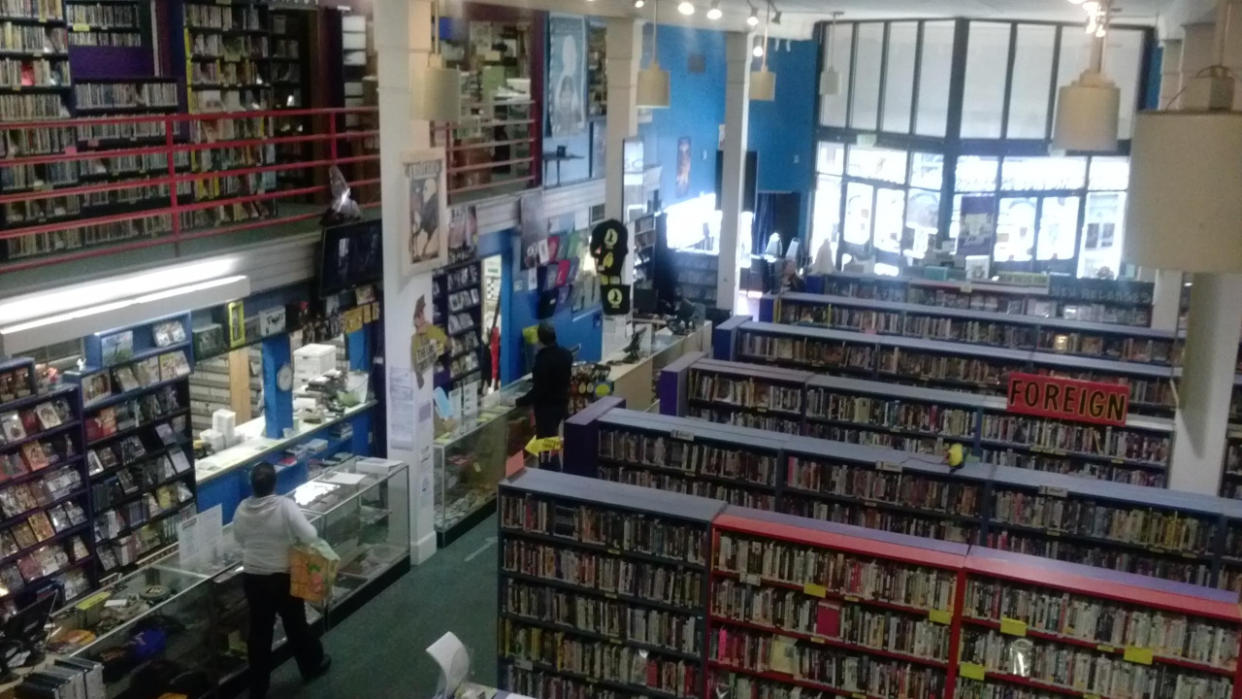Video Store Survival Tips in the Age of Netflix

Scarecrow Video in Seattle
With thousands of films available instantly online, it’s never been a better time to be a movie lover. Paradoxically, video stores — the avenue by which many of us discovered our love of movies in the first place — are going the way of the dinosaur. Or are they? In September, KQED wrote about the the troubling reductions in Netflix’s mail-order DVD selections, which means people looking for older or obscure titles are once again turning to video stores. In Wired, reporter Jennifer M. Wood profiles three independent stores (located in Brooklyn, Seattle, and Santa Monica, respectively) that are thriving in this Netflix-dominated decade. Here, according to the article, are tips for sustaining a brick-and-mortar movie rental business. Read below, then go check out the full piece.
1. Cater to people who care. “My inventory is heavily curated, but so is my staff, all of whom work in the film industry and have extensive, nerdy knowledge about cinema,” said film critic Aaron Hillis, who owns Video Free Brooklyn with his wife Jennifer Loeber. Hillis says his store trumps Netflix by offering a personal experience and a better film selection for discriminating viewers. “Coming into the shop is about nostalgia, the joy of discovery, and getting catered recommendations from passionate cinephiles,” he said. “It’s a hangout, like the record store in High Fidelity.”
2. Go nonprofit. Vidiots in Santa Monica, which was co-founded by pals Patty Polinger and Cathy Tauber in 1985, became a nonprofit foundation in 2012. The following year, Seattle’s Scarecrow Video did the same thing. This route works for stores that have a longstanding place in the community, and are providing value to all residents through educational programs, affordable screenings, film preservation, etc. Scarecrow, the largest independent video store in the United States, was able to achieve its nonprofit status thanks in part to a successful $100,000 Kickstarter campaign.
3. Build strong ties to the film community. Many of Polinger and Tauber’s donors are production companies, who were connected with their business by Vidiots customer and “guardian angel” David O. Russell. Video Free Brooklyn counts many actors and filmmakers among its customers, and Scarecrow has hosted events featuring luminaries like David Mamet and film editor Thelma Schoonmaker.
4. Embrace your independence. Kate Barr, who used to work at Scarecrow, believes that streaming services are actually taking away from viewers’ ability to choose what they see. “The thing that made VHS catch on in the ’80s was this great sense of emancipation; prior to that, the only way you were seeing a movie was just by going to a theater,” she said. “With streaming we are regressing a little bit, because once again the sacrifice we are making in order to have the ease of streaming is that we are putting that decision-making process in the hands of Netflix, Amazon, or whatever service.” By independently curating films, video stores puts the choice back in the audience’s hands. After all, sometimes it’s nice to have a movie recommended to you by a person, not an algorithm.
Related: Life After Blockbuster: Catching Up with the Owner of Some of the Last Remaining Blockbuster Stores
Photo credit: Courtesy of Scarecrow Video

